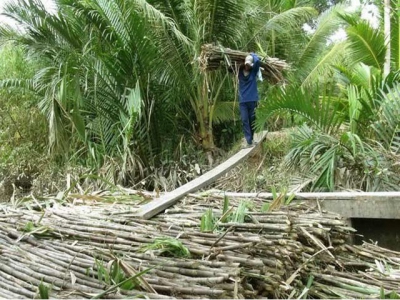Local sugar firms concerned by reduced import tariffs under ATIGA

Ho Chi Minh City - Domestic sugar companies are worried about losses in the local market as the ASEAN Trade in Goods Agreement (ATIGA) will lower the tax rates for sugar imports from ASEAN markets to only 0%-5% on January 1 next year.
A farmer harvests sugarcane in the Mekong Delta province of Soc Trang. Local sugar firms are worried about losses in the local market as ATIGA will lower the tax rates to only 0%-5% for sugar imports from other ASEAN markets - PHOTO: VNA
The Ministry of Industry and Trade had earlier proposed the Government allow a two-year delay of the agreement’s execution, as suggested by local sugar companies, news site VnEconomy reported.
After getting the Government’s approval, the ministry announced the delay to partners and confirmed it would officially lower the tax rates from January 1 next yea
On February 20, the ministry also asked the Vietnam Sugarcane and Sugar Association to announce to its members and sugarcane growers the date that the ATIGA would take effect, so that they can create appropriate production and business plans.
However, local sugar companies have yet to work out specific plans to adapt to possible changes in the market when the ATIGA takes effect.
Several sugar enterprises have proposed the Government submit a plan to the National Assembly to waive value-added tax for locally produced sugar.
According to the Ministry of Industry and Trade, domestic enterprises want the Government to continue applying safeguards to local sugar products.
They noted that sugar prices on the world market are low as many countries have sought ways to support their sugar exporters; stabilize sugar prices; and secure the interests of consumers, sugarcane growers and sugar processors.
Meanwhile, the ATIGA is just an agreement among ASEAN countries, so the fulfillment of commitments under the agreement will not significantly affect ASEAN countries’ policies on sugar production and export.
For example, Thailand, the Philippines and Indonesia stated that they have fulfilled their commitments under the ATIGA since 2015. However, they have still set up non-tariff barriers to protect their sugar firms.
Specifically, these three countries still allow sugar imports but these sugar shipments cannot be distributed in their markets without the competent agencies’ approval.
Imported sugar will only be consumed in these markets if they face a shortage of sugar.
Thailand has also used part of its profits from sugar sales to support sugar exporters.
Therefore, many Vietnamese sugar enterprises have proposed the Government consider non-tariff measures, similar to those in Thailand, the Philippines and Indonesia. Without safeguards, domestic sugar enterprises will be on the verge of bankruptcy.
According to the Ministry of Industry and Trade, these proposals are unfeasible. When Vietnam announced the delay of the fulfillment of its commitments to the ATIGA last year, it faced strong opposition from its partners, so the agreement’s execution cannot be postponed further.
The Vietnamese Government will apply trade remedies if imported sugar products pose a risk to local production and the interests of local consumers.
Related news
 Proactive fruit farming techniques
Proactive fruit farming techniques Key to the farm’s production for the export market is proactive fruit farming techniques, including extensive forward planning and constantly refining farming
 Pork prices hit all-time high in Ho Chi Minh City
Pork prices hit all-time high in Ho Chi Minh City Prices of pork hit a record high with some supermarkets in Ho Chi Minh City selling pork ribs at VND280,000 per kilogram and the price of pigs reaching
 Dragon fruit prices skyrocket in Binh Thuan
Dragon fruit prices skyrocket in Binh Thuan The price of dragon fruit in Binh Thuan province has enjoyed a steep rise during the past two weeks, a two-fold increase in price.